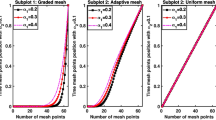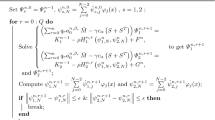Abstract
This paper presents adaptive, graded and uniform mesh schemes to approximate the solution of a fractional order advection-diffusion model, which generally shows a weak singularity at the initial time level. The temporal fractional derivative in the underlying problem is described in a Caputo form and is discretized by means of L1 scheme on a nonuniform mesh. The space derivative is discretized on a uniform mesh employing a fourth-order compact finite difference scheme. The adaptive grid is generated via equidistribution of a positive monitor function. Stability and convergence results for the proposed method on graded mesh are established. Numerical examples are provided to study the accuracy and efficiency of the proposed techniques and to support the theoretical results. A discussion about the advantages of the graded and adaptive meshes over the uniform one is also presented. The CPU times for the proposed numerical schemes are provided.











Similar content being viewed by others
Availability of supporting data
Not applicable
References
Podlubny, I.: Fractional Differential equations. Academic, New York (1999)
Giona, M., Cerbelli, S., Roman, H.E.: Fractional diffusion equation and relaxation in complex viscoelastic materials. Phys. A 191, 449–453 (1992)
Mainardi, F.: Fractals and Fractional Calculus Continuum Mechanics. Springer Verlag 378, 291–348 (1997)
Roul, P.: Design and analysis of efficient computational techniques for solving a temporal-fractional partial differential equation with the weakly singular solution. Math. Methods Appl. Sci. 47(4), 2226–2249 (2024)
Diethelm, K., Freed, A.D.: On the solution of nonlinear fractional order differential equations used in the modelling of viscoplasticity. In: Scientific Computing in Chemical Engineering II: Computational Fluid Dynamics, Reaction Engineering and Molecular Properties, pp. 217-224. Springer Verlag, Heidelberg (1999)
Bagley, R.L., Torvik, P.J.: On the appearance of the fractional derivative in the behavior of real materials. J. Appl. Mech. 51, 294–298 (1984)
Roul, P.: A high accuracy numerical method and its convergence for time-fractional Black-Scholes equation governing European options. Appl. Numer. Math. 151, 472–493 (2020)
Roul, P., Rohil, V., Espinosa-Paredes, G., Obaidurrahman, K.: An efficient computational technique for solving a fractional-order model describing dynamics of neutron flux in a nuclear reactor. Ann. Nucl. Energy 185, 109733 (2023)
Benson, D., Wheatcraft, S., Meerschaert, M.: Application of a fractional advection-dispersion equation. Water Resour. Res. 36, 1403–1412 (2000)
Dipierro, S., Valdinoci, E.: A simple mathematical model inspired by the Purkinje cells: From delayed travelling waves to fractional diffusion. Bull. Math. Biol. (2018)
Diethelm, K.: The analysis of fractional differential equations. In: Lecture Notes in Mathematics. Berlin: Springer-Verlag (2010)
Stynes, M., O’Riordan, E., Gracia, J.: Error analysis of a finite difference method on graded meshes for a time-fractional diffusion equation. SIAM J. Numer. Anal. 55(2), 1057–1079 (2017)
Zhuang, P., Gu, Y.T., Liu, F., Turner, I., Yarlagadda, P.K.D.V.: Time-dependent fractional advection-diffusion equations by an implicit MLS meshless method. Int. J. Numer. Methods Eng. 88(13), 1346–1362 (2011)
Azin, H., Mohammadi F., Heydari, M.H.: A hybrid method for solving time fractional advection-diffusion equation on unbounded space domain. Adv. Differ. Equ. 596 (2020)
Li, C., Cao, J., Li, H.: High-order approximation to Caputo derivatives and Caputo-type advection-diffusion equations (III). J. Comput. Appl. Math. 299, 159–175 (2016)
Cao, J., Li, C., Chen, Y.: High-order approximation to Caputo derivatives and Caputo-type advection-diffusion equations (II). Fract. Calc. Appl. Anal. 18(3), 735–761 (2015)
Mardani, A., Hooshmandasl, M.R., Heydari, M.H., Cattani, C.: A meshless method for solving the time fractional advection-diffusion equation with variable coefficients. Comput. Math. Appl. 75, 122–133 (2018)
Gowrisankar, S., Natesan, S.: The parameter uniform numerical method for singularly perturbed parabolic reaction-diffusion problems on equidistributed grids. Appl. Math. Lett. 26, 1053–1060 (2013)
Kopteva, N., Madden, N., Stynes, M.: Grid equidistribution for reaction-diffusion problems in one dimension. Numer. Algorithms 40(3), 305–322 (2005)
Chen, Y.: Uniform convergence analysis of finite difference approximations for singular perturbation problems on an adapted grid. Adv. Comput. Math. 24, 197–212 (2006)
Ford, N.J., Xiao, J., Yan, Y.: A finite element method for time fractional partial differential equations. Fract. Calc. Appl. Anal. 14, 454–474 (2011)
Lin, Y., Xu, C.: Finite difference/spectral approximations for the time fractional diffusion equation. J. Comput. Phys. 225, 1533–1552 (2007)
Ammi, M.R.S., Jamiai, I., Torres, D.F.M.: A finite element approximation for a class of Caputo time-fractional diffusion equations. Comput. Math. Appl. 78, 1334–1344 (2019)
Murio, D.A.: Implicit finite difference approximation for time fractional diffusion equations. Comput. Math. Appl. 56, 1138–1145 (2008)
Sweilam, N.H., Khader, M.M., Mahdy, A.M.S.: Crank-Nicoloson finite difference method for solving time-fractional diffusion equation. J. Frac. Calc. Appl. 2, 1–9 (2012)
Du, R., Cao, R., Sun, Z.Z.: A compact difference scheme for the fractional diffusion-wave equation. Appl. Math. Model. 34, 2998–3007 (2010)
Roul, P., Goura, V.M.K.P., Cavoretto, R.: A numerical technique based on B-spline for a class of time-fractional diffusion equation. Numer. Methods Partial Differ. 39(1), 45–64 (2023)
Liu, Y., Du, Y., Li, H., Wang, J.: An \(H^1-\)Galerkin mixed finite element method for time fractional reaction-diffusion equation. J. Appl. Math. Comput. 47, 103–117 (2015)
Zhang, J., Yang, X.: A class of efficient difference method for time fractional reaction-diffusion equation. Comp. Appl. Math. 37, 4376–4396 (2018)
Gong, C., Bao, W., Tang, G., Yang, B., Liu, J.: An efficient parallel solution for Caputo fractional reaction-diffusion equation. J. Supercomput. 68, 1521–1537 (2014)
Roul, P., Goura, V.M.K.P.: A high order numerical scheme for solving a class of non-homogeneous time-fractional reaction diffusion equation. Numer. Methods Partial Differ. 37(2), 1506–1534 (2021)
Das, P., Rana, S., Ramos, H.: A perturbation-based approach for solving fractional-order Volterra-Fredholm integro differential equations and its convergence analysis. Int. J. Comput. Math. 97(10), 1994–2014 (2020)
Yang, X., Zhang, Z.: On conservative, positivity preserving, nonlinear FV scheme on distorted meshes for the multi-term nonlocal Nagumo-type equations. Appl. Math. Lett. 150, 108972 (2024)
Zhang, H., Yang, X., Tang, Q., Xu, D.: A robust error analysis of the OSC method for a multi-term fourth-order sub-diffusion equation. Comput. Math. Appl. 109, 180–190 (2022)
Wang, W., Zhang, H., Jiang, X., Yang, X.: A high-order and efficient numerical technique for the nonlocal neutron diffusion equation representing neutron transport in a nuclear reactor. Ann. Nucl. Energy 195, 110163 (2024)
Yang, X., Zhang, H.: The uniform \(l^1\) long-time behavior of time discretization for time-fractional partial differential equations with nonsmooth data. Appl. Math. Lett. 124, 107644 (2022)
Yang, X., Zhang, H., Zhang, Q., Yuan, G.: Simple positivity-preserving nonlinear finite volume scheme for subdiffusion equations on general non-conforming distorted meshes. Nonlinear Dyn. 108, 3859–3886 (2022)
Yang, X., Zhang, Q., Yuan, G., Sheng, Z.: On positivity preservation in nonlinear finite volume method for multi-term fractional subdiffusion equation on polygonal meshes. Nonlinear Dyn. 92, 595–612 (2018)
Huang, J., Cen, Z., Zhao, J.: An adaptive moving mesh method for a time-fractional Black-Scholes equation. Adv. Differ. Equ. 2019, 516 (2019)
Roul, P., Rohil, V.: A novel high-order numerical scheme and its analysis of the two-dimensional time fractional reaction-subdiffusion equation. Numer. Algor. 90(4), 1357–1387 (2022)
Choudhary, R., Singh, S., Das, P., Kumar, D.: A higher-order stable numerical approximation for time-fractional non-linear Kuramoto-Sivashinsky equation based on quintic B-spline. Math. Method Appl. Sci. (2023). https://doi.org/10.1002/mma.9778
Roul, P., Rohil, V.: A high-order numerical scheme based on graded mesh and its analysis for the two-dimensional time-fractional convection-diffusion equation. Comput. Math. Appl. 126, 1–13 (2022)
Santra, S., Mohapatra, J., Das, P., Choudhuri, D.: Higher order approximations for fractional order integro-parabolic partial differential equations on an adaptive mesh with error analysis. Comput. Math. Appl. 150, 87–101 (2023)
Zhou, Z., Zhang, H., Yang, X.: \(H^1\)-norm error analysis of a robust ADI method on graded mesh for three-dimensional subdiffusion problems. Numer. Algor. (2023). https://doi.org/10.1007/s11075-023-01676-w
Das, P.: An a posteriori based convergence analysis for a nonlinear singularly perturbed system of delay differential equations on an adaptive mesh. Numer. Algor. 81, 465–487 (2019)
Das, P.: Comparison of a priori and a posteriori meshes for singularly perturbed nonlinear parameterized problems. J. Comput. Appl. Math. 290, 16–25 (2015)
Roul, P., Rohil, V.: An efficient numerical scheme and its analysis for the multiterm time-fractional convection-diffusion-reaction equation. Math. Method Appl. Sci. 46(16), 16857–16875 (2023)
Das, P.: A higher order difference method for singularly perturbed parabolic partial differential equations. J. Differ. Equ. Appl. 24(3), 452–477 (2018)
Das, P., Natesan, S.: Numerical solution of a system of singularly perturbed convection diffusion boundary value problems using mesh equidistribution technique. Aust. J. Math. Anal. Appl. 10(1), 1–17 (2013)
Luchko, Y.: Initial-boundary-value problems for the one-dimensional time-fractional diffusion equation. Fract. Calc. Appl. Anal. 15, 141–160 (2012)
Li, C., Wang, Z.: Numerical Methods for the Time Fractional Convection-Diffusion-Reaction Equation. Numer. Funct. Anal. Optim. 42(10), 1115–1153 (2021)
Das, P., Rana, S., Ramos, H.: On the approximate solutions of a class of fractional order nonlinear Volterra integro-differential initial value problems and boundary value problems of first kind and their convergence analysis. J. Comput. Appl. Math. 404, 113116 (2022)
Funding
The first author received financial support from NBHM, DAE under the project no. \( 02011/7/2023/NBHM (RP)/R \& D II/ 2877\).
Author information
Authors and Affiliations
Contributions
Pradip Roul: conceptualization, methodology, data curation, writing—original draft, software, investigation, validation. S. Sundar: methodology, validation.
Corresponding author
Ethics declarations
Ethics approval and consent to participate
Not applicable
Consent for publication
The authors give their consent for the publication of the details within the text (“Material”) to be published in the Journal and Article.
Human and animal ethics
Not applicable
Conflict of interest
The authors declare no competing interests.
Additional information
Publisher's Note
Springer Nature remains neutral with regard to jurisdictional claims in published maps and institutional affiliations.
Rights and permissions
Springer Nature or its licensor (e.g. a society or other partner) holds exclusive rights to this article under a publishing agreement with the author(s) or other rightsholder(s); author self-archiving of the accepted manuscript version of this article is solely governed by the terms of such publishing agreement and applicable law.
About this article
Cite this article
Roul, P., Sundar, S. Novel numerical methods based on graded, adaptive and uniform meshes for a time-fractional advection-diffusion equation subjected to weakly singular solution. Numer Algor 98, 531–561 (2025). https://doi.org/10.1007/s11075-024-01804-0
Received:
Accepted:
Published:
Issue Date:
DOI: https://doi.org/10.1007/s11075-024-01804-0




